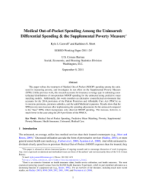Medical Out-of-Pocket Spending Among the Uninsured: Differential Spending & The Supplemental Poverty Measure
Medical Out-of-Pocket Spending Among the Uninsured: Differential Spending & The Supplemental Poverty Measure
Abstract
This paper refines the treatment of Medical Out-of-Pocket (MOOP) spending among the uninsured in measuring poverty, and investigates its net effect on the Supplemental Poverty Measure (SPM). Unlike previous work, this research accounts for insurance coverage type in estimating counterfactual distributions of non-premium MOOP spending for the uninsured using predictive mean matching models. Additionally, this work considers an alternative counterfactual environment that accounts for the 2014 provisions of the Patient Protection and Affordable Care Act (PPACA) as it concerns premiums, premium subsidies, and the adult Medicaid expansion. Results show that the SPM poverty rates increase after implementing the spending adjustments for the uninsured compared to the “base” SPM, which incorporates only observed MOOP spending. The increase, however, is much lower in the case using the 2014 provisions of the PPACA.
Others in Series
Working Paper
Working Paper
Working Paper




